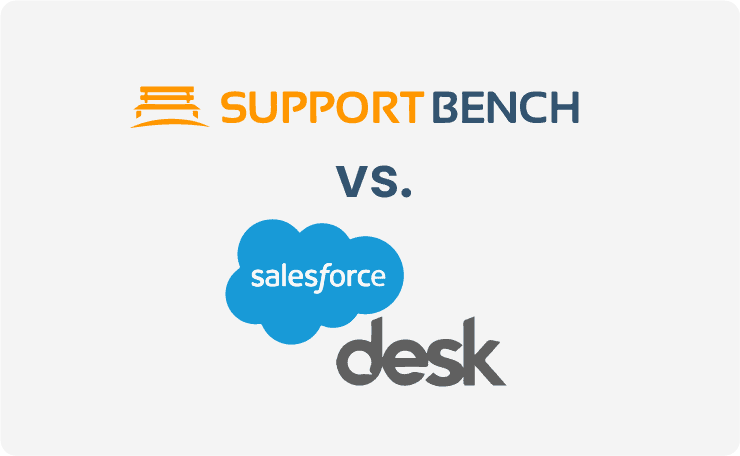With so much competition in today’s online business landscape, customer support service plays an increasingly large role in gaining new and retaining current clientele. That is why choosing a full customer service platform that is best suited for your business is extremely important.
We will focus on the two major players in the full-service sector: Desk.com and Supportbench. Not to be confused with simple “helpdesk” tools such as Zendesk, these two platforms offer comprehensive customer care for your online business and not customer support service.
In order to choose which one of these two companies is best for your business, a number of issues need to be factored in.
Desk.com vs. Supportbench Overview
Desk.com was originally known as Assistify before being purchased by Salesforce in 2011, where it was re-branded to its current state. Based out of San Francisco, it bills itself as a “slick social customer support service software” that targets small businesses and is available in over 50 languages.
Supportbench is the younger of the two companies, founded in 2016 in Vancouver. Although a smaller company, they target everything from small to larger sized businesses with their claim that they are a scalable customer service provider.
The Pricing Structures
Desk.com follows the standard per agent pricing model, plus escalating costs based on the features included. The base cost is a monthly fee for each agent that will use the service, then a tiered system for the type of services provided.
Starting at $25 per month per agent for the Standard package, it rises to $75 for the Pro and tops out at $125 on the Business Plus plan.
Supportbench completely breaks away from the typical pricing model followed by its competitor, as it’s monthly costs are based solely on your agent count. From the onset, you immediately receive the full-range of services, without having to pay any extra costs. The standard rate is $20 per agent for the first 14, then it begins to increase by $2.50 a month for each additional agent and never goes above $100 per agent.
The Comparison: Supportbench wins the pricing war quite handily, especially when the agent counts are low. Desk.com would charge $1875/month for 15 agents with all the services included, while Supportbench would charge $300 for the exact same. Even as the agents count rise over 100 for larger businesses, savings on Supportbench stay around the 25% mark per month, a significant amount of cash at that level.
On-Boarding and Setup
The on-boarding process is particularly important for businesses that are switching customer care services while in operation. If the setup is too difficult or incurs support downtime, it could cause clients dissatisfaction or even lead to business loss.
Both companies claim to have a quick and simple on-boarding process, so let’s examine the reality of the process with each.
Desk.com’s setup begins with a self-guided tour that is concise and clearly explains everything that the service offers. The interface is straightforward and because there is nothing to customize on the platform, it is solely about logging in the agents and getting them trained.
Supportbench also offers a self-guided setup, but where they truly shine is they provide you with a personal “on-boarding guru” that assists you from front-to-back in the process. From data migration to customization, your personal setup guide is extremely helpful to offer tutelage on the more in-depth features that the service has.
Comparison: While Desk.com makes it easy enough for anybody to set up, especially due to the simplicity of the interface, Supportbench really ensures that you are comfortable with the platform from the start with their one on one help.
Usability
Now that they are all ready for use, how easy is it for agents to actually navigate the interface, use the functions and begin helping customers?
Desk.com’s basic, uncomplicated interface means that agents can instantly navigate to retrieve information quite easily. However, what it offers in simplicity it lacks in ability. The dashboard does not provide agents with many options to delve deeply into tickets, holding them back from properly addressing the situations at hand.
Supportbench combines a crisp, one-window dashboard with all the features necessary for agents to resolve tickets. Displaying everything from interactions, calendar events, audit logs, task management and more, the agents are able to essentially see everything about a ticket with just one click. Although there is a lot of information in the window, the layout is easily readable and agents will not be overloaded with data.
Comparison: Both companies provide platforms that are easy to navigate, but Supportbench is clearly the winner here with its one-pane, one-click information system. Desk.com has a plain and usable dashboard, but the lack of options doesn’t help agents solve issues too easily.
Self-Service Help Platform
Allowing your clients to login themselves to find the information they need saves them time and you resources. Both services provide Self-Service solutions so that your partners can simply search and retrieve answers quickly.
Desk.com features a knowledge base and customer portal that includes branding, so clients will see your brand whenever they log in. The setup is quite easy, as you can simply copy and paste query information into the knowledge base, so you do not need a web designer to update the information. One thing it lacks is the option to create forums or message boards.
Supportbench’s self-service and customer support services are expansive, including a knowledge base, a customer portal and forums. Everything is fully customizable, meaning that branding and logos are consistent with the rest of the platform. The most impressive piece of Supportbench’s self-service is the way that forum posts are actually integrated as case tickets. By making the posts actual cases, it means that agents can escalate issues, reply directly to the customer in a chat, collect statistics or assign tasks to resolve the ticket to another department.
Comparison: While Desk.com offers clients the ability to log into a branded portal to search for answers, the lack of a forum is a drawback. Supportbench’s innovative method of integrating message posts as tickets cuts down on agent time and allows for a seamless workflow to resolve issues.
Unique Features to Each Provider
As Desk.com is geared heavily towards small-businesses with less needs, it clearly has less features to offer than Supportbench. If you are looking for something that is easy to use and do not need all the bells and whistles, you have it with Desk.com. Very basic features such as creating custom page layouts, a customer chat window and fully interactive dashboards are what are offered.
Supportbench, being focused on scalability from smaller to larger businesses, provides a wide variety of auxiliary features that can be useful as a business grows.
System Segmentation means that the various departments within your business can be using the platform, yet you can separate the information between the sectors. This prevents certain agents from seeing vital information such as policies and knowledge bases, while ensuring cyber-security and avoiding conflicts of interest.
The Customer Survey function lets users build custom surveys for their clients in order to collect feedback, satisfaction rates and calculate their Net Promoter Score accurately.
Setting Policies helps the business define how agents are able to open a ticket, view the information and then close the cases. This is vital to ensuring that everyone is on the same page and that all the agents are collecting the correct data.
Service Level Management means that you can track exactly how long it takes for you to answer a client and to rectify a situation. By setting Service Level Agreements, you define the timeline that your agents have to complete their tasks and then monitor the results to realize if the goals are being met. Unlimited SLA’s can be added, so you can track various actions across all the departments in order to offer top class customer service.
Comparison: Clearly, Supportbench offers a much deeper level of Features that are suited for growing companies. While a small-business would be perfectly fine with either provider, if you hope to grow your business in the future to the point where you have many agents working at once, the Policies and SLA Management will become incredibly important.
Platform Add-ons and Integrations
Add-ons and integrations in any service can make a big difference, as they can take a seemingly basic dashboard and offer many outside options for features and functionality. While an add-on is simply a 3rd-party interaction within a platform, an integration is a program built within an application itself to take advantage of 3rd-party apps.
Desk.com offers a dedicated App Hub that includes a vast array of major players, including Shopify, Slack, Mailchimp and many more. Using the add-ons can completely change Desk.com from a simple service to a much more powerful one. Also, the REST API means that you can integrate your own products within the platform.
Conversely, Supportbench does not allow any add-ons, but does offer integrations. Their mission is to implement 3rd-party aspects directly into their dashboard, offering seamless functionality and increased options. One such integration is JIRA, which allows agents to search, interact with, comment on and receive updates from JIRA tracked malfunctions.
Comparison: Desk.com’s App Hub has many different add-ons that can be used to expand on its limited features. Supportbench goes the opposite route and relies on integrations that are built specifically for their dashboard to ensure that the programs and applications run smoothly and work directly with the host.
Salesforce Integration
As previously mentioned, Desk.com is a Salesforce-owned company so you would assume that the migration of information would be seamless. Supportbench also allows for Salesforce integration, as is necessary when dealing with so many companies that run the world’s largest customer support service software. So, who did it better?
Desk.com integrates all of the company, contact and case information directly with Salesforce. However, completing the integration is not as smooth as one would believe for a company that is part of the Salesforce umbrella, although in the end it can be done.
Supportbench on the other hand, makes it much easier to synchronize everything from company, contact, case and product information to Salesforce. There is even the chance to create workflows to choose which specific cases should be synced to Salesforce and which contacts should be updated.
Comparison: Both providers offer relatively easy integration with Salesforce, yet ironically it is Supportbench that makes it easier on the user than Desk.com.
The Final Verdict
If you are looking for a full all-in-one customer support service platform, you have to recognize your needs as a business, including size, budget and necessities.
Desk.com is great for small businesses which want just the basic options. However, if you are a growing business or already medium-sized, the lack of options means that there may not be enough for you to offer customers and agents will be hampered by limited resources.
Supportbench seems to be the perfect support tool for small, expanding companies to medium- to large-businesses that need to get more out of the customer service platform. The wide variety of features, the flexibility to expand and the integrations mean that there is much more substance to keep customers happy. Also, the price differential that includes savings of between 25% to 500% cannot be ignored, especially for small-ish companies that are on a tight budget.












